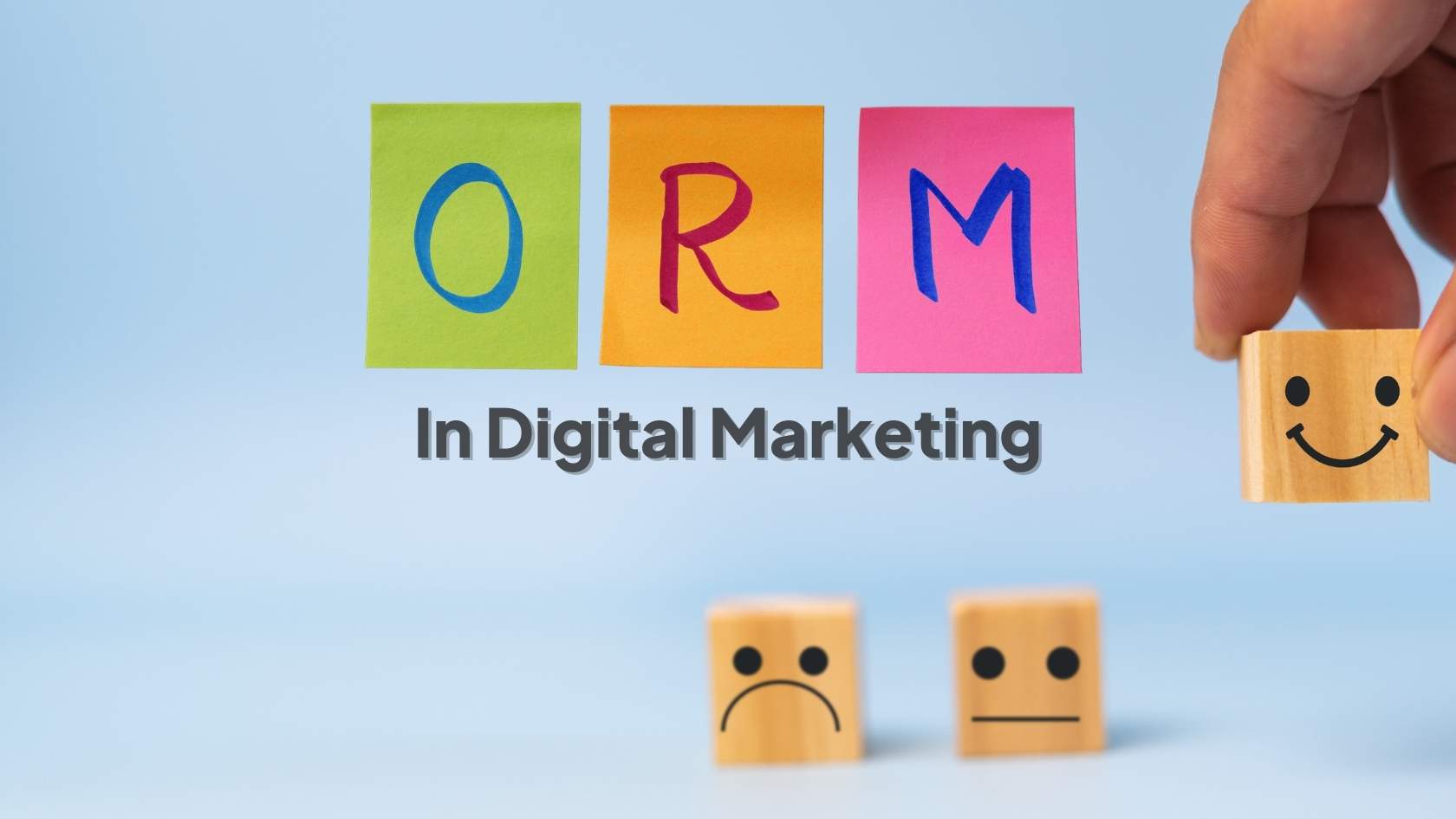In today’s day and age, where online presence can make or break a brand, businesses must take charge of their reputation. This is where ORM comes into play. ORM, or Online Reputation Management, involves monitoring, analyzing, and improving how your business is perceived online. It’s more than just handling negative reviews—it’s about building a brand image that resonates positively with consumers across all online platforms.
With millions of potential customers turning to search engines, social media, and review sites to research products or services before making decisions, managing your online reputation has never been more critical. So, let’s understand ORM in digital marketing, discuss its importance, strategies, tools, and how it can directly impact your business success.
Table of Contents
What is ORM in Digital Marketing?
ORM, or Online Reputation Management, refers to the process of tracking, addressing, and influencing the online conversations surrounding your brand. In digital marketing, ORM is vital because it shapes how your business is perceived by current and potential customers. This encompasses everything from customer reviews, blog mentions, and social media chatter to what shows up when someone searches your brand name on Google.
While many equate ORM with crisis management—responding to negative reviews or dealing with social media backlash—it’s much more proactive than reactive. A well-planned ORM strategy aims to build and maintain a positive online image that preempts negative sentiments and fosters trust.
In short, ORM in digital marketing involves monitoring online platforms, addressing customer feedback, and curating content that aligns with your brand’s values and goals.
Why is ORM Important for Your Business?

ORM is crucial for businesses of all sizes. Whether you’re a local restaurant or a global corporation, how people perceive your brand online directly affects your bottom line.
1. First Impressions Matter
In today’s hyper-connected world, consumers often form opinions based on online reviews or social media mentions before ever interacting with your brand directly. A single negative review or poor press coverage can severely damage your brand’s image if not managed properly.
2. Trust and Credibility
Brands with positive reviews and minimal negative press tend to be more trusted by consumers.
3. Crisis Management
Mistakes happen, and every business is susceptible to negative press. An effective ORM strategy helps you address these issues swiftly and efficiently, minimizing the impact on your brand image.
4. Impact on SEO
ORM in digital marketing and SEO go hand in hand. Positive online content, such as glowing reviews or engaging blog posts, can improve your search engine ranking. Conversely, negative reviews or mentions can hurt your SEO efforts, making it harder for potential customers to find your brand online.
5. Influences Purchase Decisions
A significant number of consumers rely on online reviews, social media conversations, and blog recommendations before making a purchase. Majority of people are influenced by online reviews and a lack of positive content or even neutral content can deter potential buyers from choosing your brand over a competitor.
6. Competitive Edge
In competitive industries, your online reputation can differentiate you from your rivals. Customers are more likely to trust brands with positive online feedback, giving you an edge over competitors with less favorable reputations or no visible online presence.
7. Better Hiring Opportunities
A strong online reputation doesn’t only attract customers—it also draws in top talent. Companies that manage their online reputation effectively often find it easier to hire, as prospective employees tend to research a company’s reputation on sites like Glassdoor and LinkedIn. Positive employee testimonials and strong brand credibility make you a more attractive employer.
8. Increases Customer Retention
Positive interactions, whether through review responses or social media engagement, can help foster customer loyalty. Customers who feel heard and valued are more likely to return and advocate for your brand, reducing churn and boosting lifetime value.
9. Enhanced Brand Perception
A carefully managed online reputation positions your brand as a thought leader or authority in your industry. With consistent positive engagement, informative content, and regular online interactions, you can control how people perceive your brand and improve brand equity.
Key Strategies for Effective ORM
Managing your online reputation is an ongoing process that requires vigilance, consistency, and a strategic approach. Here are some essential strategies for maintaining a positive online image:
1. Monitor Your Brand’s Online Presence
Use tools like Google Alerts, Social Mention, or Brandwatch to monitor what people are saying about your brand. Regularly tracking your brand mentions across websites, blogs, forums, and social media will allow you to react promptly and engage with customers in real-time.
2. Respond to Reviews (Both Positive and Negative)
Engagement is a cornerstone of ORM. Responding to both positive and negative reviews shows that you value customer feedback and are committed to improving your product or service. When addressing negative reviews, always stay professional, acknowledge the customer’s concerns, and offer solutions to make amends.
3. Optimize Your Content for SEO
Create and publish high-quality content that showcases your brand’s expertise and addresses common consumer queries. By doing so, you not only establish authority but also push down any negative content that may appear in search engine results.
4. Leverage Social Media
Social media platforms are powerful tools for managing your online reputation. Be active on platforms relevant to your audience, share valuable content, and engage with followers. Positive social interactions can overshadow any negative publicity and help create a loyal customer base.
5. Encourage Happy Customers to Leave Reviews
Positive reviews are the backbone of a solid ORM strategy. Encourage satisfied customers to share their experiences on platforms like Google My Business, Yelp, or industry-specific review sites. This not only boosts your credibility but also improves your rankings on review platforms.
6. Handle Negative Content Wisely
When facing negative press or reviews, it’s essential not to act impulsively. Investigate the situation, respond with empathy, and offer resolutions when necessary. At times, negative content can be removed if it’s unjustified or violates platform guidelines.
7. Create a Crisis Management Plan
Every brand should have a crisis management plan in place for ORM. This plan should detail steps to take in the event of negative press, a social media backlash, or a large-scale issue that affects your reputation. The plan should include communication guidelines, designated spokespersons, and procedures for damage control. Planning ahead helps mitigate the fallout and ensures a quick response.
8. Implement a Review Request Strategy
Proactively asking satisfied customers for reviews is a powerful way to bolster your brand’s reputation. Automating review requests via email after a purchase or offering incentives (such as discounts or loyalty points) encourages customers to share their positive experiences. Make it easy for customers by providing direct links to review sites.
9. Manage Third-Party Mentions
Your brand may be mentioned on blogs, news outlets, forums, and other platforms outside your control. Monitoring these third-party mentions and engaging with them when possible (e.g., responding to negative articles or thanking bloggers for positive reviews) helps maintain a balanced reputation. Tools like Mention and BuzzSumo can help track brand mentions across the web.
10. Educate Your Employees
Your employees are brand ambassadors, whether they realize it or not. Educate your staff on how their online behavior (on social media or elsewhere) can affect the company’s reputation. Employees should also be trained to respond to online reviews or complaints in a manner consistent with your brand’s voice and values.
Best Tools for Managing Your Online Reputation
Implementing an ORM strategy requires the right tools to ensure efficiency and accuracy. Here are some top tools that can help:
1. Brand24
Brand24 is a social media monitoring tool that helps you track mentions of your brand across the web in real-time. It offers sentiment analysis to gauge how people feel about your brand and allows you to respond to mentions directly from the platform.
2. Hootsuite
This social media management tool enables you to monitor multiple platforms, track brand mentions, and respond to customer feedback in one place.
3. Brandwatch
Brandwatch provides in-depth analytics on brand mentions across the web, allowing you to analyze sentiment and measure the impact of your ORM efforts.
4. Trustpilot
A popular review platform, Trustpilot helps businesses gather and manage customer feedback. It also allows you to respond to reviews, enhancing customer trust.
5. Reputation.com
A comprehensive ORM tool, Reputation.com helps businesses monitor their online reputation, respond to reviews, and manage their social media presence.

ORM Challenges and How to Overcome Them
Online reputation management has its challenges. Here are some common hurdles businesses face with ORM in digital marketing and how to tackle them:
1. Dealing with Fake Reviews
Fake reviews, both positive and negative, can be damaging. Some customers or competitors may leave false feedback to tarnish your brand image. To combat this, report fake reviews to the platform and provide evidence if necessary.
2. Keeping Up with Multiple Platforms
With so many platforms—Google, Yelp, Facebook, Twitter—it can be overwhelming to manage your online presence across them all. Use ORM tools that centralize reviews and mentions in one place, so you don’t miss any critical feedback.
3. Negative Publicity Going Viral
Because of social media, bad news travels fast. A single negative post can go viral in hours. Ensure you have a crisis management plan in place that includes clear communication, empathy, and transparency when addressing issues.
4. Miscommunication in Responses
One common mistake in ORM is miscommunicating with customers, especially when emotions run high on either side. A poorly worded response to a negative review can come across as defensive or dismissive, further damaging the brand’s reputation.
Designate a trained spokesperson or team to respond to reviews and comments, ensuring all responses follow brand guidelines. Keep the tone professional and empathetic, always acknowledging concerns and offering a way forward. Avoid being argumentative or condescending.
5. Lack of Internal Alignment
Sometimes, different departments within a business may not align on how to handle ORM efforts. Marketing, PR, and customer service teams might have different approaches, leading to inconsistent messaging or responses.
Ensure cross-departmental collaboration when it comes to ORM. Develop a cohesive communication strategy that all relevant teams follow. Regular internal meetings can also help ensure alignment in messaging and response strategies.
Conclusion
ORM in digital marketing is not just about reacting to negative feedback but proactively managing your brand’s online presence. By implementing a comprehensive ORM strategy, you can enhance trust, build credibility, and foster positive relationships with your customers. In the ever-evolving digital landscape, having a solid ORM plan can be the key to staying ahead of the competition and ensuring long-term business success.
Remember, managing your online reputation is an ongoing process, not a one-time task. With the right tools, strategies, and mindset, you can take control of your brand’s narrative and create a positive, lasting impression on your audience.
FAQs: ORM in digital marketing
1. What is ORM in digital marketing?
Online Reputation Management (ORM) in digital marketing refers to the strategies and practices businesses use to monitor, influence, and improve their brand’s reputation across various online platforms. It includes responding to customer reviews, managing social media comments, and optimizing search engine results to ensure a positive online presence.
2. How does ORM differ from SEO?
ORM focuses on managing a brand’s reputation by influencing how it is perceived online, including responding to reviews, addressing negative feedback, and promoting positive content. SEO, on the other hand, aims to improve a website’s ranking on search engines by optimizing content, keywords, and technical aspects to drive more organic traffic.
3. Why is ORM important for businesses?
ORM is crucial because it directly affects customer trust, purchase decisions, and brand perception. A positive online reputation can help attract more customers, improve brand loyalty, and even boost hiring efforts, while a negative reputation can significantly harm a business’s growth.
4. What are the key tools for managing ORM?
Popular tools for ORM include Google Alerts (for tracking brand mentions), Sprout Social (for social media management), ReviewTrackers (for review monitoring), and Hootsuite (for managing multiple social media channels). These tools help businesses stay on top of what’s being said about their brand online and respond proactively.
5. How often should businesses review their online reputation?
Businesses should monitor their online reputation regularly, ideally on a daily or weekly basis. Automated tools can help with real-time alerts for brand mentions, allowing businesses to respond promptly to any negative feedback or take advantage of positive opportunities.
6. Can negative reviews be removed?
In most cases, negative reviews cannot be removed unless they violate the review platform’s guidelines (e.g., false, spammy, or inappropriate content). However, businesses can respond to negative reviews professionally, showing a commitment to resolving issues, which often improves customer perception.
7. What should you do if your business faces an online reputation crisis?
In the event of an online reputation crisis, having a pre-established crisis management plan is crucial. The plan should include designating a spokesperson, crafting a unified public statement, addressing the issue transparently, and taking swift corrective actions. Managing the crisis professionally and quickly helps minimize the damage.
8. How does ORM affect a company’s bottom line?
ORM has a direct impact on revenue because it influences customer trust and purchasing decisions. Positive online reputations attract more customers and encourage repeat business, while a negative reputation can deter customers, reduce sales, and increase customer acquisition costs
9. What role do employees play in ORM?
Employees are brand ambassadors and can significantly impact ORM through their actions and online behavior. Training employees to align their online interactions with the company’s values, encouraging them to share positive content, and providing them with guidelines for handling online interactions can strengthen a brand’s online presence.
10. How long does it take to improve a negative online reputation?
The time it takes to improve a negative online reputation varies depending on the severity of the issue and the efforts put into reputation management. In some cases, improvements can be seen within a few weeks through diligent response management and the creation of positive content, but larger crises may take several months to resolve fully.

